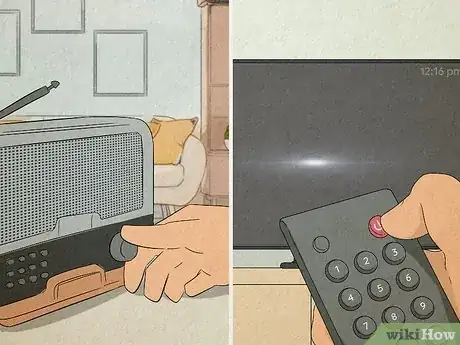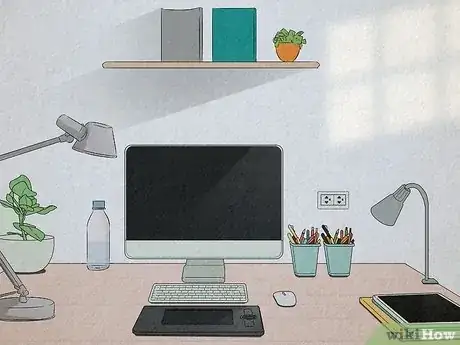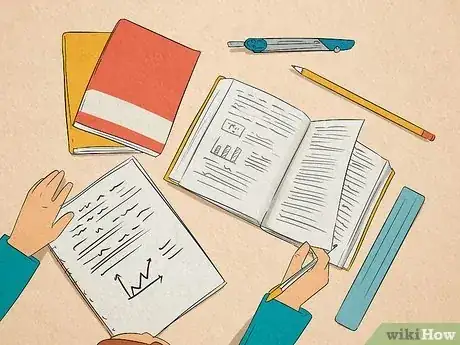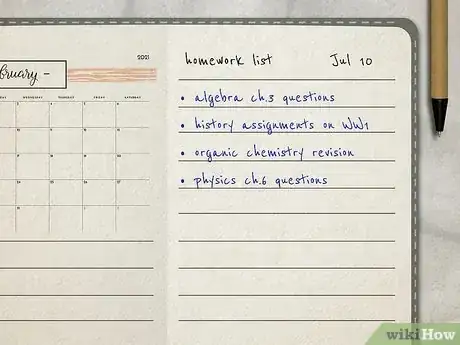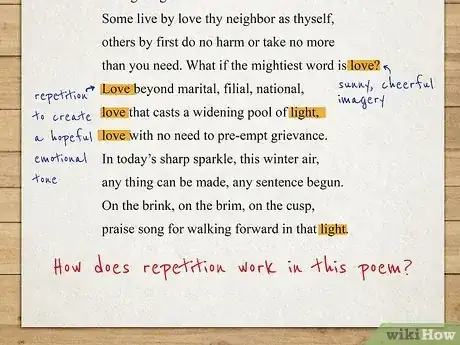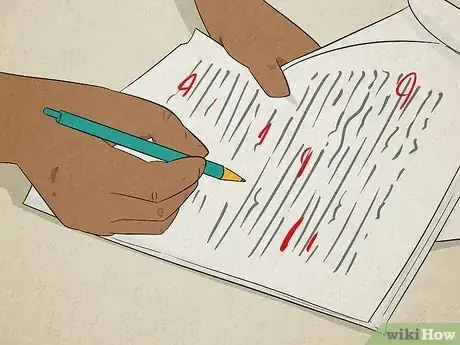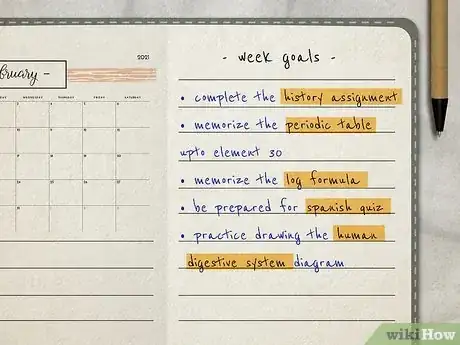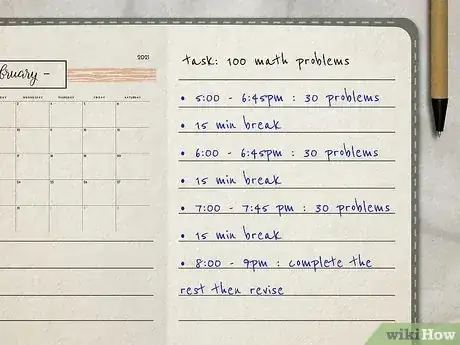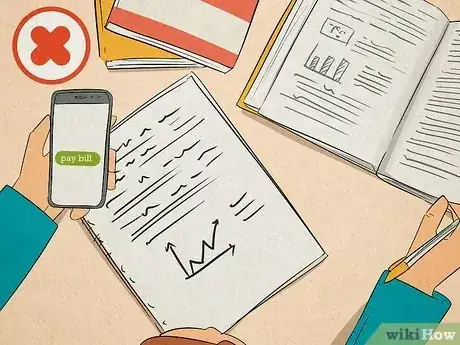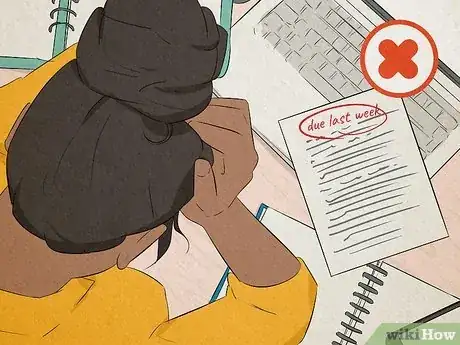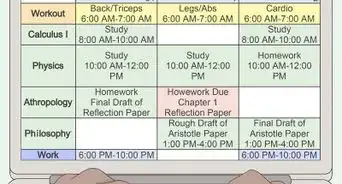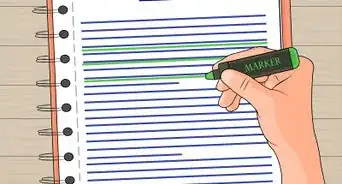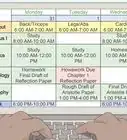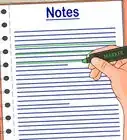This article was co-authored by Emily Listmann, MA. Emily Listmann is a private tutor in San Carlos, California. She has worked as a Social Studies Teacher, Curriculum Coordinator, and an SAT Prep Teacher. She received her MA in Education from the Stanford Graduate School of Education in 2014.
There are 7 references cited in this article, which can be found at the bottom of the page.
This article has been viewed 77,521 times.
No one likes having to do homework. It can take hours out of your evening and often times it's all too easy to put it off in favor of other activities. But the reality is you have to get your homework done if you want to succeed in school. Staying on top of your assignments and learning how to work more efficiently will make getting your homework done less stressful and much more manageable.
Steps
Creating a Productive Study Environment
-
1Turn off the TV and radio. Though it may seem like having these things on in the background will dull some of the boredom of doing your homework, they will actually make it more difficult to concentrate and your homework will ultimately take even longer to finish.[1]
- An exception to this rule is soft white noise or classical music. This generally doesn't work for everyone, you may get distracted into listening something else.
- Some people still work better and more efficiently if they have complete silence.
-
2Put away social media. Close any browser windows with email, Facebook or Twitter so you are not tempted to take frequent breaks to to check for updates. Also, just before you study, keep your phone away, it is a house of distractions.[2]
- Turn off the alerts on your phone for social media apps.
- Applications like Focus Booster and StayFocused can eliminate clutter on your screen and temporarily block access to sites like YouTube and Instagram so you don't get distracted.[3]
Advertisement -
3Find somewhere free of distractions. A library or quiet room in your house is best. If you are the type of person who can focus with a bit of white noise in the background, a quiet café might be an option. Avoid loud crowded places like restaurants or bars.
-
4Choose a place you can lay out all your materials. Find a large open table or desk where you can have your books open as well as a notebook and other materials spread out and easily accessible. Keep in mind that you don't forget your stuff while going back.[4]
Getting the Work Done
-
1Make a list. Write down what you need to get done and in what order you are going to do it. Sticking to this schedule will give you a greater feeling of control over your homework. This also helps in getting a good assumption of how much of what you want to do is left to do.
- List items starting with the most difficult. Don't look at the list too often as your mind may try to escape from the vast work you have left to do.
- If you have one large assignment with multiple parts, break those down in their own list.
-
2Start with the hardest or most boring assignments. Your ability to concentrate will be highest when you first begin doing homework which should make these more difficult tasks take less time. Take things with patience and soon you will be doing your homework at jet speed.
- If you are having trouble getting started you might start with a couple of shorter assignments that you can easily cross off your list before tackling the more difficult or more boring work.
- If you find yourself running out of steam or getting distracted, try taking a break to work on one of your easier assignment. This way you're giving yourself a chance to recharge while still staying productive.
-
3Start with the assignment instructions and questions. Understanding what you're supposed to do to get credit for the assignment is important. It can also save you time because you won't have to re-read the text or re-do the assignment.
- If the instructions are confusing, read them more than once. You could also email your instructor or a classmate to make sure you understand what you're expected to do.
- Try to answer the questions that go along with your assignment as you read.
- Make sure that you do exactly what your instructor wants you to do.
-
4Read the text you're assigned. Start with the chapter summaries or introduction, which will give you a good idea of what material is going to pop up and prepare you for what to look for as you read. Then begin reading the main body of the text. Stop after each paragraph or section to check in with yourself to make sure you understood. Try to present a short summary to yourself of what you read a moment ago.[5]
- Refer back to the essential questions or questions you need to answer as you read.
-
5Read passages out loud if you're an auditory learner. Some people learn better if they hear the text spoken aloud because they process information better this way. Reading aloud can also help you focus if you are the type of reader who feels like you always have to go back and reread sections or someone who finds their mind drifting in the middle of paragraphs.
-
6Write out an explanation. Rephrase passages or the steps to solving a problem in your own words to help your understand and memorize key concepts.
- Imagine you are explaining it someone else.
-
7Take notes in the margins. Have a pen or highlighter handy to note points that seem important.
-
8Be an active reader. Make sure you are asking questions of the text rather than just trying to breeze through the reading. Consider the writer's intent, organization, voice etc.
-
9Change chapter titles and headings into questions. For example Rudiments of Geological Mapping becomes What are the Rudiments of Geological Mapping? Now as you read you can be looking for the answers to this question.[6]
-
10Break longer assignments up into smaller tasks. If you have a hundred math problems to do, tell yourself you have to get twenty of them done in the next 30 or 40 minutes. If you have ten chapters to read in a novel, focus on getting through one or two at a time with brief breaks in between.[7]
-
11Review your work to make sure you satisfied the requirements. This will ensure that you receive full credit. Check your work against the instructions to make sure you did everything correctly. Then proofread your work to check for errors.
Managing Your Time
-
1Set goals. Before you get started write down what you hope to accomplish. Is your goal to finish the outline for a paper? To complete the practice test at the end of the chapter in your math book? Be realistic about what you can get done while still challenging yourself.
-
2Give yourself rewards. Setting up small rewards for yourself can be a great motivator as long as you practice restraint and stick to your schedule. [8]
- Have a granola bar or some almonds as a snack.
- Listen to some music.
- Give yourself five minutes to check social media.
-
3Take short breaks. Sitting and focusing for a long period of time can be exhausting. Giving your brain and body a break will help you stay alert. Take a ten minute break every hour or so to get up, stretch, walk around or grab something to eat.
-
4Set a timer. This can be a helpful way to get started. Tell yourself you need to work for a half an hour straight before you can do anything else. You can increase the time as you go to start training yourself to work for longer periods of time without a break.
-
5Do your homework at the time that works best for you. Everyone has a time of day when they work most efficiently. Schedule your homework during this time to make it easier for you to get the work done quickly. This will save you time without any extra effort on your part!
- For example, you may find that you're better able to concentrate right after school rather than during the late evening. In this case, you'd want to do your homework right after school every day.
- Track yourself for a week to see when you focus best. During that week, sit down at different times and try to concentrate on an academic task.
-
6Don't rely on too much coffee. Caffeine can make you more alert and help you stay awake, but too much can leave you jittery and anxious which will make getting your homework done even more difficult. Try to stick to one or two cups.[9]
-
7Take full advantage of study hall. Most high school students have study hall time. Use this to get as much of your homework done as you can so you won't won't have such a daunting amount when you get home.[10]
- If you are in college, set time aside in between classes to visit the library or another quiet place.
-
8Avoid multitasking. Work one assignment at a time. See the assignment through to the end.
- Don't do homework and pay bills at the same time.
- Don't talk to friends.
- Don't try and cook or clean while doing your homework.
Knowing When and How to Ask for Help
-
1Make sure you've done all you can. Don't just stop at a problem you don't understand and immediately go out and ask for help. Instead, skip it and move on. You may discover the answer further into the homework. If not, you don't want to burden someone with too many questions. Stick to the items you truly can't work out yourself.[11]
-
2Don't fall behind on your homework. Schedule enough time to get all of your assignments done early. Sticking to your schedule will help you avoid a lot of needless stress.[12]
-
3Get the email address or phone number of a few classmates. Reaching out to another student in class can be a great way to get a little extra help.
- Make sure you contact them with specific questions.
- Offer to be a resource to them as well should they need help in the future.
- Don't be a burden. Only reach out after you've truly exhausted all other options.
-
4Form a study group. Getting together with other students to get homework done can be a great motivator.
- Find like minded students who are eager to work hard.
- Try to meet regularly once or twice a week.
- With or without a group, you should ask students for their phone numbers and keep a lists by class. This way if you are in a jam and do not know what the homework was, or when a test is, you can ask another student for help. It sure beats studying for a test that was postponed and it sure beats working on a homework that the Teacher already did for everyone in class.
-
5Get a tutor. If you are having trouble in a particular class, seeking the help of a professional tutor could be helpful. A tutor will be able to give you the one on one attention you need to stay focused on your homework and help you answer any questions you may have along the way. Many times the school, college or university will provide free tutoring on campus after school hours.
-
6Talk to your teacher. Your teacher may be able to meet with you before or after school to give you some extra guidance. You could also try sending them an email, especially if you're nervous about asking for help. They'd be happy to help you better understand the material and course requirements!
-
7Ask your friends or classmates how they work efficiently. They may have habits or ideas that will also work for you. Completing homework assignments and studying for exams are both learned skills. It's possible that your friends and classmates have skills to share with you.
- Start with friends or classmates that are working on the same assignments you are.
- Not everything that works for your friends will work for you. Consider what they have to say and try out things that might be helpful!
Community Q&A
-
QuestionWhy should I do the hardest homework assignments first if I know that it takes most of my time?
 Community AnswerWhen you start your homework, that is when you are the most motivated and awake. If you do it at the end, you are more likely to be burnt out and unmotivated. Also, some people prefer to get the hardest assignments out of the way first so that they don't have to worry about them anymore.
Community AnswerWhen you start your homework, that is when you are the most motivated and awake. If you do it at the end, you are more likely to be burnt out and unmotivated. Also, some people prefer to get the hardest assignments out of the way first so that they don't have to worry about them anymore. -
QuestionWhat if you can't get help from a tutor, teacher, parent, friend, or anyone and you don't understand the work?
 Community AnswerThere are a number of websites designed to assist students with homework; research those that pertain to the subject with which you're having trouble.
Community AnswerThere are a number of websites designed to assist students with homework; research those that pertain to the subject with which you're having trouble. -
QuestionHow do I deal with mental fatigue and dissociation and many other issues when trying to think clearly to get work done well?
 Community AnswerGet enough sleep every night, limit distractions like TV and computer games during the week so you can use your time to finish homework. Try not to stress over it, and just do the best you can.
Community AnswerGet enough sleep every night, limit distractions like TV and computer games during the week so you can use your time to finish homework. Try not to stress over it, and just do the best you can.
References
- ↑ http://kidshealth.org/en/teens/homework.html#
- ↑ https://studyskills.com/students/homework-staying-focused-to-get-it-done-faster/
- ↑ http://www.pcworld.com/article/2048449/get-back-to-work-great-software-for-reducing-distractions.html
- ↑ http://scs.tamu.edu/?q=node/74
- ↑ http://scs.tamu.edu/?q=node/74
- ↑ http://scs.tamu.edu/?q=node/74
- ↑ https://studyskills.com/students/homework-staying-focused-to-get-it-done-faster/
- ↑ https://www.psychologytoday.com/blog/mental-wealth/201206/10-tips-make-homework-time-less-painful
- ↑ http://www.webmd.com/add-adhd/ss/slideshow-brain-foods-that-help-you-concentrate
